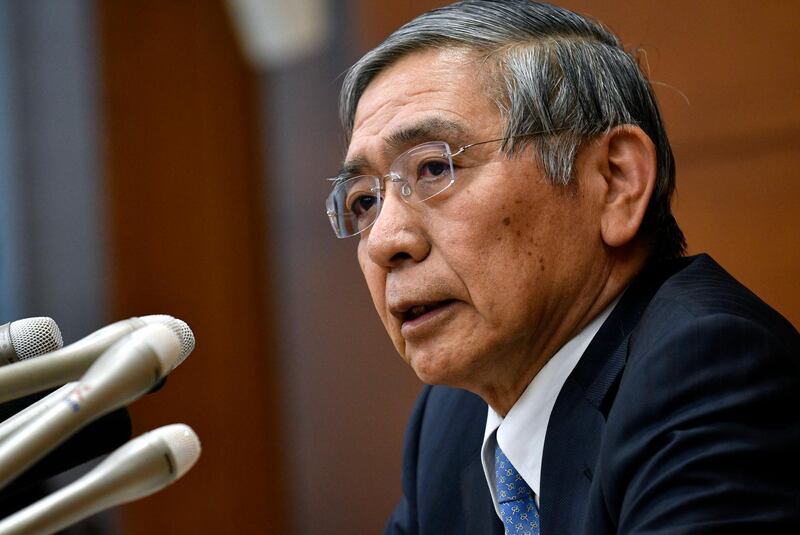When Japanese Prime Minister Shinzo Abe nominated Haruhiko Kuroda to a second term as governor of the Bank of Japan, he gave the central banker a gift that might hold the key to policy over the next five years.
Far from simply pushing the BOJ toward further easing, Mr Abe has provided Mr Kuroda with room to manoeuvre should he need to execute a policy shift - in either direction. He did so by nominating two new deputies, one of whom has Cardinal Richelieu-like qualities that could prove very useful in Japan's uncertain economic environment.
In the short term, the BOJ's pedal-to-the-metal monetary policy is certainly justified, partly to contain the yen. Yet it stands out from its G7 peers in having no exit strategy. The bank will not even entertain a discussion about how or in what order it might put away its many stimulus tools, or even what conditions might warrant a discussion.
The silence is unfortunate, because it prevents the bank from acknowledging the progress that it has made in reviving Japan's economy and getting inflation at least some way toward its 2 per cent target. There's a long way to go, but don't let that obscure a critical point: Few people talk about a deflationary spiral in Japan anymore.
If things continue on their present path, at some point Mr Kuroda will need to pivot, and there may well be dissension within and without. That is where his new Richelieu, Masayoshi Amamiya, comes in. (Another analogy might be Sir Humphrey Appleby, the fictional head of the civil service in the BBC series Yes, Prime Minister).
_______________
Read more:
Shinzo Abe asks Bank of Japan to keep up with reflation
Will 2018 be the year Abenomics finally comes of age?
_______________
Although Mr Amamiya is little known outside the salons of central banking, his influence is hard to overstate. Known as "Mr BOJ", Mr Amamiya ran both the bank's monetary affairs group and markets division, a rare combination of experience drafting policy and riding shotgun on investors' reaction to it. His unofficial job will be to have Mr Kuroda's back.
Most attention has mistakenly been focused on the other new deputy governor, Masazumi Wakatabe, a professor dubbed a "reflationist". In the Japanese context, where monetary policy is already uber-loose, this translates as favoring pumping still more money into the economy. But Mr Wakatabe merely succeeds another reflationist, Kikuo Iwata, who is stepping down.
That is why the real attention should be on Mr Amamiya. Behind the scenes, he has spent decades at the bank, shaping and implementing policies based on guidance from above. No doubt he's learned a trick or two and has a huge rolodex of business cards.
As Toru Fujioka and three Bloomberg News colleagues wrote in a 2016 profile, Mr Amamiya has served governors who have taken very different approaches to economic cycles. Mr Kuroda is but his latest patron. Pragmatism, rather than reflation or monetarism or anything else, has been his trademark.
After a series of contentious votes on quantitative easing, Mr Kuroda opted for a strategic rethink. Guess who he turned to? The review shifted policy away from simply scooping up enormous amounts of bonds. The new framework seeks to spend only what’s required to keep the 10-year government yield around zero. Sometimes purchases can be dialled up, sometimes down.
The appointments of Mr Amamiya and Mr Wakatabe - among the worst-kept secrets in Japan, according to Bloomberg writers Toru Fujioka and Masahiro Hidaka - provide stability for the world’s third-largest economy and mean aggressive monetary stimulus will stay in place for now. Mr Kuroda also offers global continuity in a year of transition for other central banks, with Jerome Powell newly installed at the helm of the Federal Reserve and People’s Bank of China chief Zhou Xiaochuan thought likely to step down.
“The choices point to continuity in policy, with an implicit message that Japan will do what it takes to reflate the economy, even as other major central banks start to withdraw stimulus," Bloomberg Economics’ Yuki Masujima wrote.
But if Mr Kuroda needs to alter course again, you can bet Mr Amamiya will be the second-most important person in the room - at least.
Mr Amamiya considered a career as a classical pianist and still plays regularly. The notes he hits in the next few years will say a lot about Japan's trajectory.
Given the country's reputation as a laboratory, it will say a lot about the direction of the world economy, too.
Bloomberg





